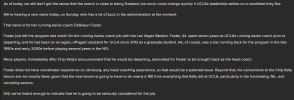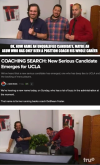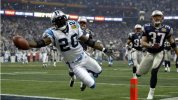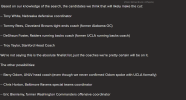UCLA HC Hot Board (UPDATED 2/11 5AM)
- Thread starter Carm
- Start date
Welcome to tPB!
Welcome to The Platinum Board. We are a Nebraska Husker news source and fan community.
Sign Up Now!-
Welcome to The Platinum Board! We are a Nebraska Cornhuskers news source and community. Please click "Log In" or "Register" above to gain access to the forums.
You are using an out of date browser. It may not display this or other websites correctly.
You should upgrade or use an alternative browser.
You should upgrade or use an alternative browser.
goucla103ben
Bench Warmer
- Messages
- 3
- Likes
- 1
UCLA Should HIRE JASON CANDLE FOR HCYeah with the Big 10’s fat stacks of cash coming you’d think they could pony up to get someone more proven.
- Messages
- 117
- Likes
- 428
Nice of you to stop by our humble board Mr. Candle to let us know you’re interested in the job.UCLA Should HIRE JASON CANDLE FOR HC
- Messages
- 2,642
- Likes
- 9,803
UCLA is not a serious program if these are the names being thrown out
- Messages
- 7,256
- Likes
- 32,500
It's as if they already have a HC and they are interviewing for a potential OC.UCLA is not a serious program if these are the names being thrown out
goucla103ben
Bench Warmer
- Messages
- 3
- Likes
- 1
Yeah I saw him and pj fleck are candidates for head coaching jobNice of you to stop by our humble board Mr. Candle to let us know you’re interested in the job.
- Messages
- 568
- Likes
- 3,874
He interviewed for SDSU and got turned down, but people are worried about UCLA taking him. Just say it out loud.Besides SDSU, I don't think White has been mentioned for any jobs. The pressure is on UCLA so I think they will have to go after a flashier hire(even if it is only by perspective) but considering White went to UCLA I think completely disregarding the possibility is wishful thinking.
- Messages
- 10,296
- Likes
- 84,551
- Messages
- 1,042
- Likes
- 3,657
Granted they had a coaching change but Bieniemy's had issues in Washington:
Eric Bieniemy lasted one season with the Commanders. Here’s what went wrong.
By Nicki Jhabvalaand
Sam Fortier
In one of his first major decisions as the Washington Commanders’ new coach, Dan Quinn fired offensive coordinator Eric Bieniemy on Monday with a year remaining on his contract. The move seemed likely at season’s end and inevitable when the Commanders named Kliff Kingsbury their new offensive coordinator. But it was a significant turn for Bieniemy, who arrived a year ago to great fanfare.
The Commanders job, which had its share of difficulties with an unproven starting quarterback, gave Bieniemy play-calling duties and the added title of assistant head coach. But he inherited a roster that was built for the offense of the previous coordinator, Scott Turner, and included minimal investment in the offensive line. Even so, it appeared to be another step toward trying to prove he deserved to run a team after he spent five seasons as the Kansas City Chiefs’ coordinator and interviewed with 15 teams to be a head coach.
But in Bieniemy’s lone season in Washington, the Commanders’ offense was inconsistent and unbalanced, and quarterback Sam Howell regressed as the season went on. Bieniemy was hardly the team’s only or biggest problem; its 4-13 finish was the result of myriad issues on the field and in the front office.
Before Bieniemy arrived in Washington, his high-profile pursuit of a head coaching job had already raised questions about why so many teams had passed him over, and his quick exit from the Commanders raised more. He interviewed for the Commanders’ coaching vacancy last month but was not believed to be among the finalists for the job.
So what went wrong? Why was Washington so quick to move on?
Ultimately, Quinn, like many coaches, wanted his own guy, and knew he wanted to bring Kingsbury with him when he got another shot as a head coach. And Washington’s on-field results last season factored into the decision. The team tied for 23rd in offensive scoring and 24th in third-down efficiency and finished 30th in rush rate (38.2 percent) when the clock or scoreboard didn’t dictate run or pass.
In the locker room, signs of frustration were evident throughout the season. After Washington’s last game, a blowout loss to the Dallas Cowboys, tight end Logan Thomas was as direct as any player had been about the simmering tensions between Bieniemy and his players.
“I might be the only one to say it, but I think we had our ups and downs [with Bieniemy],” Thomas said. “We had some good. We had some bad. It’s one of those things where something new comes in after you’ve been used to something else for a couple years, and sometimes you can bang heads. But I respect him for coming to work every day and being the same person every day.”
Other players, who spoke on the condition of anonymity to discuss internal team dynamics, described Bieniemy as a hard-working coach who hamstrung his own efforts with poor communication, stubborn play-calling and a disregard for player feedback.
Bieniemy did not respond to a request for comment.
One of the first public conflicts Bieniemy had with a player was in early August. During a training camp practice, cornerback Benjamin St-Juste hit tight end Cole Turner hard and stood over him, glaring. Wide receiver and team captain Terry McLaurin believed the play had been unsportsmanlike and got in St-Juste’s face.
From the sideline, Bieniemy screamed at McLaurin and others to “stop with the dumb s--- and do your f---ing job.”
McLaurin yelled back: “Can’t do that s--- to your teammate, bro!”
The next week, then-coach Ron Rivera said some players had gone to him because they were “a little concerned” about Bieniemy’s coaching style. Rivera attempted to clarify his comments the following day, and multiple players went on the record to acknowledge the value of Bieniemy’s hard-nosed approach.
As the season progressed, friction remained. Multiple people said there was often confusion on game days because offensive adjustments were not clearly communicated to players and assistants didn’t seem to be on the same page. Behind the scenes, some players urged their position coaches to beg Bieniemy to run the ball more. The pass-heavy attack placed an extra burden on the offensive line and the quarterback — and when Washington’s offense did run, it averaged the seventh-most yards per carry in the NFL, 4.43 yards.
“I don't think they gave [Howell] a fair chance,” a player said. “I felt like we became a one-dimensional team.”
Another player blamed Rivera for not forcing Bieniemy to run the ball more or fixing the disconnect between the offensive and defensive staffs.
“We didn’t play complementary football all year long, and that came back to haunt us,” the player said.
Some players felt Bieniemy’s intense practices, though helpful in training camp, left them exhausted before games, and they believed the practices created a greater risk of injury. Bieniemy’s title of assistant head coach gave him greater authority than most coordinators, allowing him to script practices and alter players’ schedules during the week. One player felt Rivera delegated too much and failed to step in or make changes quickly when warranted.
“It was EB’s f---ing team,” another said.
Rivera, who declined to comment for this story, did meet with Bieniemy midway through the season to discuss his approach and suggest the offense run the ball more, a person with knowledge of the meeting said.
The Commanders opened the season with two wins, and many players said they welcomed Bieniemy’s changes, especially early on.
“The idea that people were rejecting any sort of change at all is just stupid,” one player said. “ … We needed to have some change.”
But Washington lost its next three games, a stretch that culminated in a 40-20 loss to the previously winless Chicago Bears at FedEx Field. Facing a massive early deficit, Bieniemy called 53 consecutive passes in that game. Howell was hit 11 times and took five sacks. Several players saw that moment as a turning point.
Two weeks later, the New York Giants used blitzes and man-to-man coverage to beat up Howell, who took six more sacks and 12 hits. McLaurin, who rarely critiques coaching decisions or play calls, said he thought the Commanders could have countered better.
“When teams are blitzing like that, it leaves one-on-one opportunities, and I felt like we got to that late,” he said. “Hopefully going forward we just get to it a little earlier and give us chances to make plays down the field.”
Even though their offense was explosive at times early in the year, the Commanders had a perplexing inability to consistently involve their playmakers. In a December loss to the Miami Dolphins, McLaurin didn’t have a catch for just the second time in his career.
“I ran a lot of cardio,” he said afterward.
Bieniemy, who is Black, was unable to land an NFL head coaching job during his Chiefs tenure despite the fact that he helped develop the game’s best young quarterback and won two Super Bowls as a coordinator. He became the face of the league’s minority hiring issues, and his move to the Commanders was regarded as an attempt to escape from Coach Andy Reid’s shadow and improve his chances as a head coaching candidate.
“I think his coaching future is great,” Reid said Wednesday. “I mean, I’m obviously a big fan of his, and I know the things that he can do.”
The Commanders were the only team to interview Bieniemy for a top job during this hiring cycle, when four of eight open coaching jobs went to minority candidates. The league has nine active minority head coaches, including six who are Black.
After the season, when it had become clear Bieniemy’s time with the Commanders was ending, the team gave him permission to speak with Chiefs players ahead of the AFC championship game.
“Just having him back in the building was really cool, listening to him talk, his energy,” quarterback Patrick Mahomes said Wednesday. “I think guys had a little bit of chill bumps, like, ‘Hey, EB’s back here.’ Obviously, he didn’t get that head coaching opportunity, but I’m excited for him to continue to coach football and to continue to make his impact on the game.”
On Monday, before Quinn’s introductory news conference at the team’s headquarters, the Commanders’ new coach met with Bieniemy to finalize the inevitable.
“We’re not going to work together here, but in this coaching brotherhood, I wanted him to know, man, I really respect the work that he’s done,” Quinn said. “ … I was really pumped that he took his shot this year and went for it.”
- Messages
- 3,432
- Likes
- 9,996
He and DeAngelo Williams were my fantasy backfield for a year and killed it for meI was a big Deshaun Foster fan in 2003 View attachment 33726
- Messages
- 10,296
- Likes
- 84,551
He and Stephen Davis were unstoppable that year they went to the Super Bowl.He and DeAngelo Williams were my fantasy backfield for a year and killed it for me
- Messages
- 15,954
- Likes
- 41,717
Were they unstoppable in the Super Bowl?He and Stephen Davis were unstoppable that year they went to the Super Bowl.
- Messages
- 10,296
- Likes
- 84,551
Idk. I mostly remember Janet Jackson’s nipple and the Panthers tying it up at the end only for Kasay to kick it out of bounds so Brady only needed like 20 yards for the game winning FGWere they unstoppable in the Super Bowl?
- Messages
- 568
- Likes
- 3,874

Tony White’s Replacement
We had this article written and done before Chip Kelly left his head coaching job at UCLA to be the offensive coordinator at Ohio State. It has caused all sorts of craziness in Husker land with eve…
 herbieshangout.com
herbieshangout.com
- Messages
- 2,135
- Likes
- 10,609
***Breaking: Rhule actively trying to give our best coordinator to a conference opponent***
Seriously though if that’s true who wouldn’t want to be a coordinator for Matt?
Similar threads
- Replies
- 1K
- Views
- 13K
- Replies
- 2
- Views
- 130





